Despite recent controversies over issues at the intersection of religion and science, such as evolution and stem cell research, there is broad agreement that scientific advances help mankind. Nearly two-thirds of Americans (65%) take a positive view of scientific advances; just 19% say they harm mankind.
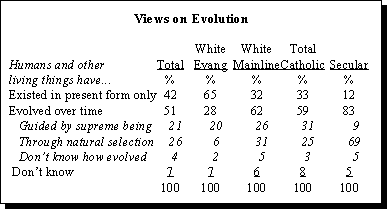 Solid majorities in every major religious group say that scientific advances help rather than harm mankind. The view that science is helping mankind varies from 63% among mainline Protestants to 72% among white Catholics.
Solid majorities in every major religious group say that scientific advances help rather than harm mankind. The view that science is helping mankind varies from 63% among mainline Protestants to 72% among white Catholics.
But the issue of evolution and the origins of life remains highly divisive. Specifically, the views of white evangelical Protestants are very different from those of other groups, with a majority (65%) rejecting the notion that humans and other living things have evolved over time, and espousing the view that life has existed in its present form since the beginning of time. Just 28% of evangelicals believe in evolution, and only 6% think evolution occurred through natural selection.
Among seculars and most other religious groups, majorities believe in evolution: this includes 59% of white Catholics, 62% of white mainline Protestants and 83% of seculars.
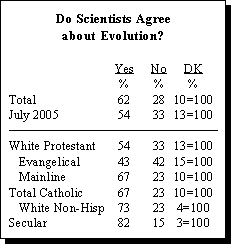 But mainline Protestants and Catholics who believe in evolution are themselves divided over the question of whether evolution occurred through natural selection or was guided by a supreme being for the purpose of creating human life in its present form. Overall, 31% of mainline Protestants believe in natural selection, while 26% believe a supreme being guided the process. Among Catholics, 25% subscribe to the idea of natural selection and 31% think evolution was divinely guided. Only among seculars does a majority accept natural selection: 69% of respondents with no religious affiliation believe that life evolved through natural selection.
But mainline Protestants and Catholics who believe in evolution are themselves divided over the question of whether evolution occurred through natural selection or was guided by a supreme being for the purpose of creating human life in its present form. Overall, 31% of mainline Protestants believe in natural selection, while 26% believe a supreme being guided the process. Among Catholics, 25% subscribe to the idea of natural selection and 31% think evolution was divinely guided. Only among seculars does a majority accept natural selection: 69% of respondents with no religious affiliation believe that life evolved through natural selection.
The rejection of evolution is not entirely a result of a lack of awareness of the scientific consensus on the subject. More people believe that scientists agree on evolution (62%) than accept the idea themselves (51%), and this is true even among white evangelical Protestants (43% think scientists agree on evolution but only 28% believe in evolution). Nor is the rejection of evolution a result of political or ideological beliefs. While Republicans and conservatives are more apt than Democrats or liberals to deny that evolution occurs, this correlation is mostly a result of the large number of evangelicals with creationist views in the Republican Party and among conservatives.
Global Warming
 Religious differences are somewhat smaller on the facts related to another controversial issue, global warming. An overwhelming majority of those polled (79%) believe that there is solid evidence that the average temperature of the earth has been increasing over the past few decades; just 17% say there is no solid evidence for this. Sizable majorities of every religious group agree: 77% of Catholics; 79% of white mainline Protestants; and 70% of white evangelicals.
Religious differences are somewhat smaller on the facts related to another controversial issue, global warming. An overwhelming majority of those polled (79%) believe that there is solid evidence that the average temperature of the earth has been increasing over the past few decades; just 17% say there is no solid evidence for this. Sizable majorities of every religious group agree: 77% of Catholics; 79% of white mainline Protestants; and 70% of white evangelicals.
Most of those who believe that the earth is getting hotter also believe that human activity such as the burning of fossil fuels is responsible: based on the total sample, 50% say this, and 23% say it is mostly a result of natural patterns in the earth’s environment. But there are somewhat larger differences across religious groups on this question: 52% of Catholics and 48% of white mainline Protestants believe the earth is getting hotter and think this is because of human activity, while fewer evangelicals think this (37%). Fully 62% of seculars feel that global warming is occurring because of human activity.
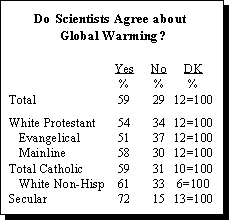 Some of the difference between evangelicals and other religious groups regarding the existence of global warming are a result of the more Republican and conservative political views of evangelicals. But after these factors are taken into account, white evangelicals remain slightly less likely than others to believe that global warming is occurring or that it is the result of human activity.
Some of the difference between evangelicals and other religious groups regarding the existence of global warming are a result of the more Republican and conservative political views of evangelicals. But after these factors are taken into account, white evangelicals remain slightly less likely than others to believe that global warming is occurring or that it is the result of human activity.
There are also differences among religious groups in the perception that there is a scientific consensus on global warming. Overall, 59% of the public says that scientists agree that global warming is occurring and that it is caused by human activity; 29% think there is no scientific consensus. White evangelicals are less likely than other religious groups to see scientific agreement: 51% of evangelicals believe there is agreement, compared with 58% of mainline Protestants and 59% of Catholics. Fully 72% of seculars think scientists agree on this issue.
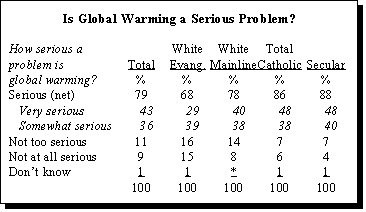 These differences are mirrored in views of whether global warming is a serious problem, requiring immediate government action. Only about three-in-ten white evangelicals (29%) view global warming as a very serious problem, compared with four-in-ten white mainline Protestants and nearly half (48%) of Catholics.
These differences are mirrored in views of whether global warming is a serious problem, requiring immediate government action. Only about three-in-ten white evangelicals (29%) view global warming as a very serious problem, compared with four-in-ten white mainline Protestants and nearly half (48%) of Catholics.
While most Americans see global warming as a problem that requires immediate government action (61%), this view is not shared as widely among white evangelical Protestants and mainline Protestants (49% and 53%, respectively).
 On the more general question of how environmental regulations affect the country, a majority of Americans (57%) continue to say that stricter laws are worth the cost, while 31% say they cost too many jobs and hurt the economy. Religious groups vary in their opinions, with support for the pro-environmental regulation view ranging from 76% among seculars down to 47% among evangelicals. Much of the difference between evangelicals and other groups can be explained by the large number of Republicans and conservatives among the evangelical population.
On the more general question of how environmental regulations affect the country, a majority of Americans (57%) continue to say that stricter laws are worth the cost, while 31% say they cost too many jobs and hurt the economy. Religious groups vary in their opinions, with support for the pro-environmental regulation view ranging from 76% among seculars down to 47% among evangelicals. Much of the difference between evangelicals and other groups can be explained by the large number of Republicans and conservatives among the evangelical population.
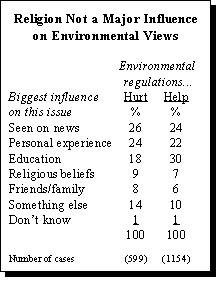 This point is underscored by the fact that very few people say that their religious views are the most important influence on their thinking about environmental regulations. Asked to choose among a list of five possible influences what they have seen in the news, a personal experience, their education, their religious beliefs, or their friends and family just 8% said religion was the most important influence. And the number who chose religion was basically the same for those who said environmental regulations are worth the cost as for those who said regulations hurt the economy.
This point is underscored by the fact that very few people say that their religious views are the most important influence on their thinking about environmental regulations. Asked to choose among a list of five possible influences what they have seen in the news, a personal experience, their education, their religious beliefs, or their friends and family just 8% said religion was the most important influence. And the number who chose religion was basically the same for those who said environmental regulations are worth the cost as for those who said regulations hurt the economy.
Overall, 63% of the public has a favorable opinion of the environmental movement, while 25% view it unfavorably. But evangelicals are less positive than the public as a whole, while Catholics and seculars are more positive. Opinion about the environmental movement also varies considerably by political leaning, with 78% of liberal Democrats holding a favorable opinion compared with just 43% among conservative Republicans.


